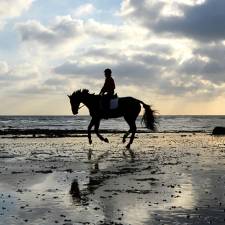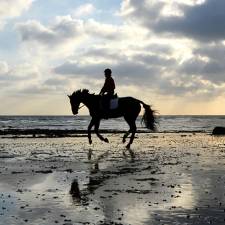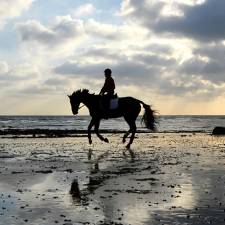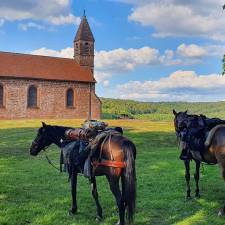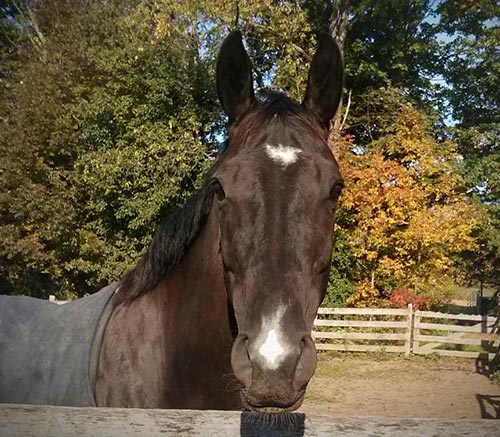
by Kathy Farrokhzad
You might have liked horses all your life.
Or you might have had an awakening not too long ago that is urging you to explore horseback riding for the first time.
You can't tear your eyes away from the sight of glowing coats and rippling muscles.
You get excited every time you drive by horses in a field.
Contrary to your friends, you even like the smell of a barn!
And now, you know you are ready to take the first steps on the long road of becoming an equestrian. You've booked riding lessons at a local barn and you are convinced that you are ready to tackle the learning curve that lays ahead. Before you begin, here are nine tips to smooth the way into your new adventures!
1. Be prepared to be a beginner - for a long time!
Once you step into that stirrup for the first time, forget all about instant gratification. Instead, get all pumped up for the accomplishment of doing something for the long term.
Don't worry if your fingers fumble when putting on the bridle. Have no worry when the horse gives you a knowing look out of the corner of his eye: "This one is a beginner!" Just take the plunge into new feels, new learning curves and new coordination. It's all about the joys (and challenges) of being on the path.
2. Every horse has something to teach you.
If you ride at a riding school, and have had the chance to ride many horses over the course of a few years, you will truly understand that there is something to be learned from every horse you ride.
If you part-board or lease a horse, you can have the opportunity to work with one horse over the long term. You might develop a deeper relationship and maybe even know each other so well that you can read each other's minds. But always be appreciative of the chance to ride new horses because they will add to your depth of experience and repertoire of "language" you need to ride effectively.
3. Find an excellent mentor.
Your mentor might or might not be your instructor. However, this person will be critical to the success of your first years as a horse rider. She will be the one who can listen to your questions and concerns and give you the answers you need for your situation. She will guide you in your decisions and help you find the solutions that are necessary for your development - even if you are not aware of them at the time. Find someone you can trust.
4. Surround yourself with great professionals and horse friends.
It is true that you are the sum of the influences around you. So search for people you admire and look up to. Find the ones who you would like to emulate. Then, be around them and learn from them at every opportunity.
Get to know the professionals in your area - from nutrition, to health care, to training - it is essential for you to be surrounded by kind, compassionate people who always put the horse first when they make decisions.
5. Although the initial learning seems quick and easy, don't despair once your learning curve seems to slow down.
At some point, your riding skills will plateau and try as you might, new learning becomes frustrating and difficult. Be ready for that time period and be willing to keep trudging through - until you reach your next series of leaps and bounds. However, the plateaus will always reappear just before the next real learning curve; they are just a fact of life.
6. Be ready to be physical in a way you've never experienced before.
Riding is like no other sport because of the presence of the horse.
Rubbing your belly and chewing gum is an easy task compared to riding! In order to truly move with the horse, you have to learn to coordinate body parts you never knew you had, and then also stay on top of a moving 1,000 pound animal! But have no fear - it will all come together in the long run.
7. Watch, read, study, do.
It goes without saying that there is much learning to be done off the horse's back. Read books to study what the movements should be like. Watch videos of professionals and even amateurs (especially now that videos are so easily accessible on the Internet). Go to clinics and watch how other riders develop under the eye of an experienced clinician. Then take your own lessons, ride at clinics and shows or video yourself. Use every available means to solicit feedback.
Then study some more!
8. Be wary of the "a little knowledge is a dangerous thing" stage.
This happens to everyone at least once in their riding career. There eventually comes a time, once you have made your mistakes and learned from them, that you begin to feel pretty confident about your equine-related skills. The tack no longer defies you. You develop the balance and coordination needed to walk, trot and canter without feeling like you might fall off any second. You can even ride and talk at the same time!
When it all starts to come together like this, you might become a little more confident than were at the beginning. You start to take more riding risks. You might think about changing routines to suit yourself better - change the barn, or ditch your instructor!
Before you head off into the land of grass is greener everywhere else, heed these words! You will want to spread your wings and fly - that is a fact. However, although there are certainly many ways to Rome, especially in the equine world, don't "instructor hop". Nothing is more confusing than trying to comprehend different people's systems over and over again.
9. Listen to your horse.
Although it sounds a little far-fetched, it is indeed possible to "hear" your horse if you understand their routines, structures and communications. If life is good, your horse will show you his pleasure by becoming more rideable. He will be calm but at the same time responsive to you. He will improve his ground manners, develop consistency under saddle, and work with you toward a better partnership.
If, on the other hand, he becomes less receptive, more difficult to handle, and lose overall condition, you will know this is not the path you want to be on. Just listen and then make decisions according to the feedback.
Well, there you have it! Hopefully, these tips will help you as you progress from newbie to old-timer!
Find out more about Riding Disicplines of all kinds from English to Western!
The article was originally published on Horse Listening and is published here with permission.







